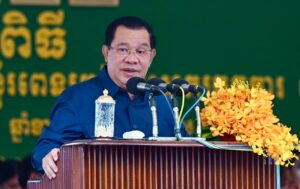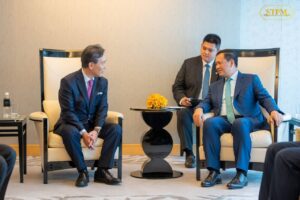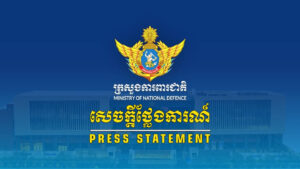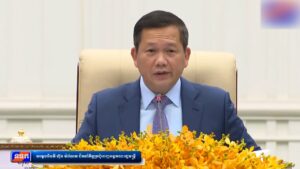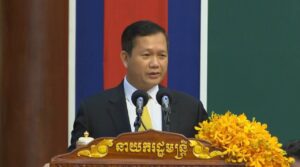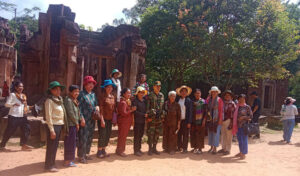Selected Comments Samdech Moha Bovor Thipadei Hun Manet, at the inauguration of “the Dhamma Stupa, the Marble Carvings, Concrete Roads and Achievements in the Cambodian Buddhist Cultural Center” [Unofficial translations]
[4]
(1) With peace, people have rights and freedom of religion, and the ability to build religious achievements
[…] If we talk about attaining peace and merit making, we can confirm that (the two events) are related to one another […] it is with peace that we can perform religious/Buddhist rituals or merit making. Without peace and the provision of right and/or freedom, to celebrate religious observances can be difficult. It is with peace that religions flourish. It is with peace that we obtain the right and freedom (of religion) that we are able to build (such religious shrines). It is with peace that people can afford to donate resources to help with such marvelous construction. And, it is with peace that the Cambodian people, both inside and outside the country, can join together to realize such achievements […] let us come together to build more achievements for our children […]
(2) The liberation of human life on January 7, helping to build a life from scratch, the granting of religious freedom, and peace through win-win politics are all merits making or performing good actions
[…] Peace allows us to practice (Buddhist/religious actions) […] in these 45 years, the Royal Government has issued policies regarding performing good actions. (Firstly,) the big merit making was the liberation of human life on January 7, 1979 (from the genocide) […]; secondly, merits are made with the people to build a life from scratch until we now can not only afford the opportunity to learn but also the capacity to build […]; thirdly, the granting of religious freedom has offered the opportunity to prosper in religious practices. Another big good action is the fact that we can sit here is because of the win-win politics […] which is based on mutual understanding and leniency. This is the good action performance, non-discrimination, understanding in the Khmer spirit, whereby, we provide guaranteeing on the life, securing of property and jobs of the former Khmer Rouge rank and file […]
(3) That there is no religious conflicts, Cambodia is at peace and stability
This religious practice not only brings peace, but also shares the goal of maintaining peace. A society without merit making and/or mutual understanding, whether in Buddhism, Christianity or Islam, there would be no peace and no stability. If people continue to discriminate, communities that are living along each other would be in conflict. In some countries, there are many religions, but they are not in good term with each other. It is quite often that followers from one religion inflict damages on another. In Cambodia, we do not have religious conflicts. That is the (good) understanding that is coming out of people’s celebrations of religious rites, which culminate in stable peace, and cause no conflict […]
(4) Virtue and morality from worshipping and mutual understanding are fundamental in maintaining peace and stability
We encourage competition to develop, to grow, and to succeed, but there must be boundary. The primary boundary are the virtue and morality, which is formed on the basis of rituals and mutual understanding. The competition for one to win that would not care whoever dies or perishes will lead to (national) dissolution. If we work together morally, virtuously, and understand each other, and are aware of where the boundaries are, our actions will serve as the foundation of maintaining peace and stability, because it is the mutual respect/understanding that enable the country to continue to grow […]
(5) Understanding each other, helping each other when there are difficulties, refraining from hurting others, together continuing to build peace, unity and national unity are all merits making
The word merit making does not means that one should do it only in the (Buddhist) pagodas. The word “merit making” means that in our everyday working and living life, there need to be mutual understanding, helping each other in times of difficulty, refraining from hurting others, continuing to build the foundation of peace and national unity, all of these are merits-making. The importance of the merit making is for Cambodia to be stronger […] (whereas in life,) there is nothing more important that advice for learning to live in good term together, to learn to perform good deeds, to learn of how to unite, to learn to share […]
(As we can see that these) achievements here are happening by sharing. Firstly, the Royal Government of Samdech Techo handed over 126 hectares of land in the national park for the project. This is sharing. Secondly, the sharing of resources, budget, physical and mental strength of Oknhas and Nak Oknhas, as well as the initiators and benefactors to work together to build this (religious shrine). (This religious marvel) was built, not for personal use, but for sharing (with everyone). Anyone, not just religious practitioners, even tourists can come to visit. We do not limit it to only the Buddhist followers […]
(6) In epoch of modernity and materialism, we must turn individual competition to one for common growth
There have been various competitions, especially in epoch of modernity and materialism, that we must turn each individual competitions and combine them to be the competition for the common growth/good. For these nieces and nephews here, whether you are in the Red Cross, scouts or whatever unform, your competition is learning and doing social work. Do not compete with samurai swords […] in fact, weapons do not kill people, and weapons do not do anything wrong. It is human who does. Guns are made to protect peace and security. Do not use it to rob or threaten others. Young people, young men, young women, teenagers are in the age that wants to see something different. It is good to be brave, but not in the wrong way or orientation by law will be enacted. For the well-being of all, (competition for the common good) is what we must continue to do to strengthen all religions […]
(7) It is absolutely necessary to prevent extremist ideologies, both in religion and in the secular worlds to jointly maintain peace in society
All religions must unite so that Cambodia does not have religious conflicts […] we must prevent extremism in each religion […] religious leaders are to stand united, stand together, as our communities live alongside each other, and our people – either following Buddhism or Islam – are living in villages next to one another and they do not have (religious conflict). Regardless of their religions, people study in the same school, work together, get the opportunities together to serve in the Royal Government, in the private sector. We have people of different religions that hold positions in the armed forces and/or other positions in the state […] war does happen because of weapons but of human. It started with their mindset […] the same person in 1970 had become different in 1975 because s/he had been induced with ideology to carry out different actions. Therefore, it is absolutely necessary to prevent extremist ideologies, both in religion and in the secular world, in order to jointly maintain (peace in society) […]
(8) Knowledge without merit would not be useful
Kampong Speu has great potential […] and will enjoy future benefits. Phnom Penh has expanded and become narrow. Sihanoukville has great potential, along with that Kampong Speu has got potentials in both agriculture and industry. Soon, we will build another road (linking Kompong Speu) to the Koh Kong port. However, with these potentials, without human resources, Kampong Speu will not be able to benefit […] or to seize the opportunity […] in other word, the human resources in Kampong Speu have the opportunity coming. Adherence to morality and virtue is essential for human resources and oneself building, (whereby, a person cannot) have only knowledge (but) has no merit. Merit making and sharing is good, but we need to work together, and help each other […]
(9) The Funan Techo Canal construction to start in August with the majority of Cambodian shares
People have seen clearly and rendered support to Samdech Techo’s historic initiative to build the Funan Techo canal, which is of great interest for the nation […] some have said that the canal is to be built for Vietnam’s benefit, and some once said it will be for China’s interest to attack Vietnam. No matter what they say. The question is who will benefit from the canal? The Funan Techo canal is built in the Cambodian territory. It is for the Cambodians […] Once we link up our national economy with that of the world, the Cambodian people will benefit from our stronger economy. This is a historical project that the people have supported […] we do not hesitate.
When construction starts, there will be many Cambodian shares. We negotiate with a Chinese investment company so that it provides the technology and some investment. Now, we have negotiated that there will be many Cambodian shares in the construction of this project […] of which, we will launch the construction in the coming August […] when we are placing our hearts together to do something, I am sure the Cambodians together can do it. With or without the participation of outside investors, Cambodians will make it happen […]./.

